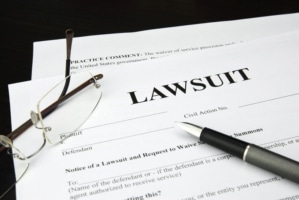By Angela M. Rossi, Esq.
As we approach the holiday season, we are reminded of things for which we are thankful. One of these could be avoiding a lawsuit.
The following list suggests 15 maxims which, when applied to your personal and professional life experiences, can substantially reduce the likelihood of litigation against you, or if sued, can greatly enhance your chance for victory:
1. Document Everything: Letters, bills, notes, contracts, records and witnesses can be easily forgotten, lost, or overlooked. Good record keeping and diligence in documenting all promises, due dates, breaches, damages and costs are central to proving your position.
2. Put It in Writing: An oral promise is generally worth the paper it’s printed on. More litigation arises out of “swearing contests” than any other dispute.
In a he-said/she-said situation, a piece of paper, a memo, or a contemporaneous writing will provide the greatest weight. Memories fade over time. For example, in a case involving a partnership dissolution, a dispute arose between a client and his ex-partner as to ownership of certain equipment for their business. The receipt for the purchase of the equipment was made out to the partnership which indicated that the equipment belonged to the partnership. The client, however, found an email in a long email chain that addressed various ongoing issues related to the business which acknowledged that the client had paid for the equipment out of his own pocket because the partnership was short on cash. In the email, the client stated that in order to save the expense for the cash-strapped partnership, he proposed that the partnership did not have to pay him back. However, in the unlikely event that the partnership ended, the property would be his and his alone. The response email from his partner was “agreed”. As a result of the email chain, the client got to keep the equipment.
3. Do Not Omit the Details: If it is important, discussed, and/or negotiated, it should be included in the final written agreement. Otherwise, the courts will generally find the writing will control and any other oral side understanding will not be considered.
4. Confirm Everything in Writing: A simple letter or e-mail stating the terms of an agreement or contents of a telephone call is very persuasive evidence. Silence in response to your confirmation is tantamount to an admission of its accuracy. Conversely, dispute in writing any written correspondence received which does not justly represent your understanding.
5. Think Not What Does This Mean to Me, But What Would a Neutral Third Party Think We Meant: Anything written is not to confirm your understanding, but to establish what a jury or judge thought you meant. Remember that audience when writing. Keep it simple and to the point so an average unbiased person would read the correct intent into your writing.
6. Keep a Diary, File or Log On Troublesome Issues: When something starts to go bad, do not wait for a complete collapse. Begin to document now. Open a file, diary and/or log specifically for the problem issue. Gather and store all notes, documents and thought therein, including your general follow-up on issues. By creating a timeline, log notes and cache of all important papers, you are way ahead if trouble arrives.
If an employee, for example, failed to complete a crucial assignment on time, or otherwise messed it up, it is important to document that. If you don’t have time to do a formal write-up, a simple email to the employee or even an email just to yourself will suffice to document the poor performance. Verbal counselling sessions, too, should be reduced to writings. These can and should be placed into that employee’s personnel file (whether electronically or printed out on paper) for future reference. If in the future the employee is terminated for poor performance, a well-documented file showing repeated problems will help overcoming a wrongful termination or discrimination claim. This is especially true because it may not come up for 2 to 3 years at a deposition when memories fade.
7. Believe in Preventive Lawyering: Like Medicine, Dentistry and most professional activities (accountancy, automotive care, etc.), the best use of a lawyer is preventive care, not after the complete judicial entanglement has begun. Like those other professions, it is an unavoidable part of doing good business and smart living today. A simple consultation, contract review, telephone call or letter can be obtained at extremely reasonable rates. Like avoiding future surgery, root canal, tax audit or engine overhaul, it more than pays for itself over time.
8. In God We Trust; For All Others, Business is Business: Faith and trust are for religion, not business. Assume everyone is capable of deeds which you cannot imagine and protect yourself accordingly. Most litigation interviews start with the following statement from the client: “I cannot believe [he/her/they] would do this to me.”
9. Think At Every Stage–Even if the Other Person Lies, What Unbiased Evidence Supports My Position: In litigation, expect that the other side will bend the truth, embellish, overstate, omit important information, or commit some act which is different than your understanding of the truth. From start to end, think in terms of gathering proof about what really happened, including photos, writings, notes, letters, records, witness information and similar unbiased and uncontroverted documentation.
10. If a Person Asks You to Rely on “Trust” Rather Than Following Good Business Practices, Do Not Trust Them: If a person is trustworthy, they will follow good business practices and have no hesitation about memorializing their promises. Those people who work in the shadows want to avoid the harsh light of accuracy, truth and justice.
11. Do Not Agree or Sign It Unless You are Prepared to Do It: You would be surprised how many people sign things without reading the entire contents. Those provisions govern the deal whether or not you read it. The courts assume you did. Relying on the other party’s oral representations about what is or is not in the agreement is folly and unenforceable.
12. The 80/20 Rule: 80% of litigation is generated by 20% of the public. By identifying this class early in the deal, you can greatly reduce your risk of exposure. Remember, anyone can sue you if they have $320.00 for the filing fee and can fill in a court form, even if the grounds are baseless and untrue. It can take years and large sums of money to be relieved from even a frivolous suit, usually with little or no recourse against the vexatious litigant.
13. Being Right Has Very Little to Do With Who Wins: Many times, it is not who is right, wrong, or whether justice is served. It is who can prove their position. Liars, cheats, and scum often win cases over honest, good and righteous people. Be prepared.
14. The Three Rules to Understanding Virtually Every Case: All lawsuits are composed of three elements in deciding its outcome: (1) liability, (2) damages and (3) collectability. Liability is concerned with did someone do something wrong under a recognized theory of law. Damages follow by considering whether that wrong directly caused some type of harm/injury/loss, and to what extent. Even if you have established liability and damages, does the other party have a sufficient financial resources against which to collect your judgment? If any of these elements is missing or difficult, the viability of the case substantially decreases. What is the value of a judgment in any amount if it is “not worth the paper it is written on”?
15. Listen To Your Attorney: If you obtain advice, do not ignore it. Work with your attorney to formulate a plan or procedure which addresses your needs, concerns and financial limitations, but do not freelance or disregard the opinion. It generally causes many more problems than it solves.
We are all living through uncertain times and the need for sound and sage advice — to deal with both current conditions and plan for the future– has never been more important. At Bradley, Gmelich & Wellerstein LLP, we are uniquely positioned to advise our clients on business advice, employment and independent contractor issues, or personal injury litigation. We are here for our clients, regardless of the environment in which they find themselves in need of counsel. If you have any questions, feel free to contact Bradley, Gmelich & Wellerstein LLP so we can help you with your specific needs.
Happy Holidays to all.

She is an accomplished litigator both in and out of the courtroom with experience that includes countless trials and binding arbitrations. Her law practice includes products liability, premises liability, security guard law, construction defect, trucking company defense and personal injury. In her construction defect practice, Ms. Rossi is highly skilled in defending small subcontractors to general contractors and large developers.
Ms. Rossi is licensed to practice before all courts in the State of California and before the United States District Courts in the Central District of California. She is a member of the United States Supreme Court.

